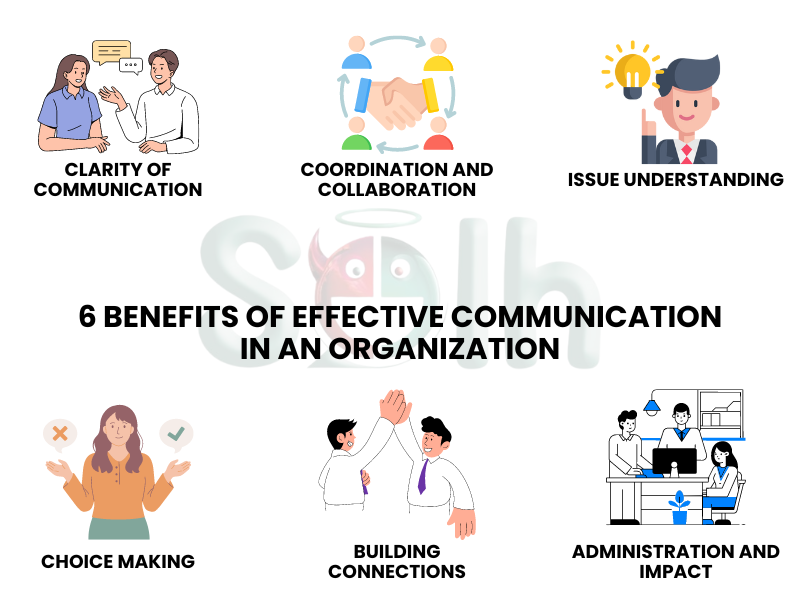Every organization's communication skills are important for the growth of the organization and the enhancement of self-esteem and self-confidence of its employees.. An employee is required to communicate in an organization at every stage of the hierarchy, from CEO to manager to subordinate to teammates. It's important to express ideas to contribute to organizational and individual growth.
No matter which industry you're in—whether it's the pharma industry, mental health industry, or teaching industry—communication is vital in every field.
Several methods for Efficient Communication in an organization
A variety of techniques and procedures can be used to create effective communication within a company. Here are a few strategies for efficient communication:
1. Observe the situation around you
Timing is often a critical factor in politely speaking up. Sometimes, how and whether someone hears what you say depends on when and how you choose to present it. For example, it's best to avoid talking about any salary-related matter when meeting with your boss, colleagues, and a significant business customer. Using common sense and good judgment, you can usually tell if a situation is appropriate for discussing an issue.
2. Begin by asking questions
Although it may seem daunting to speak up at first, think about beginning by asking questions when the time is right. Asking your manager a clarifying question can be a great opportunity during a small employee meeting, as it might not feel as frightening as an annual company employee meeting. Saying, "You mentioned the company wants to work with local charities more," is one example of what you could say. Can we propose any charities?
3. Talk With Confidence
With practice, experience, and education, confidence can grow over time. Some people are simply more self-assured than others at times. Speaking out and projecting confidence into your speech can encourage others to listen to what you have to say. Speaking confidently involves looking people in the eyes when talking to them. If you're addressing a group, consider alternating your gaze between participants.
4. Active Listening
When people talk, give them your whole attention to show that you appreciate what they say. To guarantee mutual understanding, actively listen by nodding, seeking clarification, and summarizing essential points.
5. Promote Conversation
Make time for brainstorming sessions, open conversations, and team meetings so that ideas can flow freely. Promoting Communication encourages teamwork and creativity.
6. Make Use of Several Channels
To make sure that communications are effectively received by all stakeholders, use a variety of communication channels, including in-person meetings, emails, instant messaging, video conferencing, and collaboration technologies (like Slack and Microsoft Teams).
7. Implement Effective Feedback Systems
Create straightforward channels for employees to offer suggestions, pose questions, and express their concerns. Make sure to respond to feedback quickly to promote a culture of open dialogue.
8. Incorporate Visual Tools
Employ visual tools like charts, graphs, and illustrations to improve comprehension and involvement when discussing intricate topics.
9. Set Clear Objectives
Align your communication strategies with the company's goals and aims. Clearly outline what is expected, what is most important, and the key milestones to ensure everyone remains on track and motivated.
10. Provide Regular Updates
Keep all involved parties informed about the progress of projects, ongoing initiatives, and any organizational changes. Consistent updates are crucial for maintaining clarity and unity.
11. Etiquette and Respect
Maintain polite and respectful manners in all forms of Communication, whether written or spoken. Avoid aggressive language and be aware of cultural nuances.
12. Follow-Through
After conveying significant information or making important decisions, it's crucial to follow up with the necessary parties to ensure they understand and to clarify any remaining doubts or issues.
13. Courses and Resources
Offer courses and tools for better communication with your staff. This investment can lead to improved interactions throughout the company.
14. Open Body Language
The use of open body language (such as maintaining eye contact, facing the person you're speaking with, and maintaining a comfortable stance), shows openness and truthfulness. The result is a positive and supportive workplace atmosphere built on trust and good relationships.
15. Be Precise and Brief
State your point clearly, avoiding complex terms and unnecessary detail. Use straightforward language that everyone can grasp.
Customize Your Communication
Adjust your communication style and content to match the audience's preferences and needs. Consider their level of understanding, their roles, and how they prefer to communicate. By implementing these tactics, companies can improve the efficiency of their communication, encourage teamwork, and foster a positive and efficient work setting.
7 Cs of Effective Communication in an organization -
- Clearness: Ensure your message is straightforward to understand, avoiding confusion.
- Conciseness: Keep your message brief and to the point, avoiding unnecessary details.
- Correctness: Ensure your message is grammatically correct and accurate, and double-check facts.
- Concreteness: Use specific examples and data to support your points.
- Completeness: Provide all necessary information and address potential questions or concerns.
- Courtesy: Be respectful and considerate, using polite language and being aware of cultural sensitivities.
- Consideration: Consider what your audience needs and what their perspectives are when crafting your message.
It is essential to follow these principles in order to establish and maintain a positive work environment, aid teamwork, develop a problem-solving process, make decisions, build relationships, and manage change.
Effective speaking is vital to an organization's success.

Clarity of Communication: Clear communication guarantees that everybody gets their parts, errands, and objectives. This clarity minimizes mistaken assumptions and advances effectiveness.
Coordination and Collaboration: Successful talking cultivates coordination and collaboration. When individuals in a team can verbalize thoughts clearly, they can work together more comfortably and effectively to realize shared goals.
Issue Understanding: Communication is fundamental for addressing and tackling issues inside the organization. Clear and open discourse makes a positive difference by helping in recognizing challenges, discussing arrangements, and executing changes.
Choice Making: Effective communication fosters credible decision-making. When data and suppositions are communicated clearly, pioneers and groups can make superior choices that adjust to organizational objectives.
Building Connections: Communicating makes a difference in building positive connections inside the organization. It advances belief and creates a strong work environment where thoughts can be unreservedly traded.
Administration and Impact: Pioneers who communicate successfully rouse certainty and motivate their groups. Their capacity to communicate vision, technique, and desires upgrades their impact and viability.
To conclude, talking effectively inside an organization is essential for maintaining clarity, cultivating collaboration, understanding issues, making educated choices, building connections, driving viably, and overseeing change. It contributes essentially to the organization's general adequacy and success.
Circumstances when it's fitting to talk up within the working environment
There's ordinarily a time to speak up, especially within the work environment. The primary question you might ask yourself is whether the circumstance permits it or if there's a more fitting time to speak what’s on your mind.
Here are a few circumstances that might offer an excellent opportunity to engage in a conversation:
You observe possible issues: You may observe a possible issue with a specific company procedure that, if left unattended, could lead to further problems. For example, the company employs a structured sales script similar to each customer. Still, you know it can be more effective to make minor adjustments to account for different market segments. You could begin by saying you've observed a consistent decline in monthly sales for women aged 18 to 25. After that, you can discuss why sales are dropping and offer potential solutions.
You observe injustices at work: It's critical to identify injustices that you observe at work. Even though some circumstances are unintentional, the people involved may suffer adverse effects. You can frequently contribute to upkeep a more inclusive workplace by speaking up. It's usually best in this kind of situation to find out what the company policy is and to proceed according to it. Many businesses allow people who report specific problems to stay anonymous.
You can add positive feedback: It's appropriate to speak up if you have something positive to say during a discussion, especially about company projects or programs. This frequently contributes to raising the general confidence level among project participants and the work environment. It may even inspire others to express their worries.
You are in a meeting.
Usually, managers anticipate that staff members will attend meetings. Try speaking up in a situation like this. Try to present your ideas or suggestions if asked in a meeting. You can also try asking interesting questions that may pop-up while attending the meeting.
Effective communication is a crucial skill which can foster better connections in a professional workspace. Besides just building better connections, it streamlines the overall working process bringing a positive impact on the organization. The individual growth of employees contribute effectively to the organization’s overall growth and success. Therefore, organizations should focus on providing a supportive environment for employees .
Solh Wellness is a preventive mental health platform which focuses on adopting practices which helps in improving the mental well-being of individuals. You can get the following at Solh Wellness:
Normalises Seeking Help: Solh combats the stigma connected with mental health by establishing a judgment-free zone. This can encourage someone who is struggling to seek expert help.
Anonymous Support Groups: Connecting with those who understand your problem can be useful. Sharing experiences and realizing they are not alone can provide a great source of comfort and encouragement.
Talk Now: When dealing with overwhelming emotions, have access to a counselor who can help you guide you through any hiccup you face.
Clinical Support: The app's simple access to confidential consultations can be an excellent initial step for someone struggling to achieve goals who is hesitant to pursue traditional in-person therapy.
Other: Solh is a one-stop place for accessing and navigating different sources, such as audio, guides, and reading material, to help you deal with any ongoing stressor.
Download the Solh App now!



